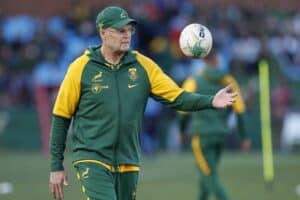Rassie Erasmus arrived after the lows of 2016 and 2017 to give the Springboks their meds … turns out there was nothing wrong with their bodies, it was all in their heads.

South Africa’s director of rugby Rassie Erasmus posted a classic put-down on social media before the series against the British and Irish Lions about a lion not concerning himself when a sheep offers an opinion. Despite the Springboks proving those naysayers wrong with their brilliant effort to win the series, the critics somehow remain.
The bitter losers up north have been complaining non-stop about the “boring” style of play of the Springboks, forgetting that it was the Lions who set the tone for the series when they dominated the second half of the first Test through their kicking game and driving maul.
Australasian critics have deliberately ignored the massive intensity and physicality of the series by saying the rugby was boring; maybe for the neutral, but certainly not for the supporters of the two teams.
Erasmus himself has been roundly criticised, and charged with misconduct by WorldRugby, for his video exposé of refereeing mistakes in the first Test. Again, it has been forgotten that Lions coach Warren Gatland started that war by disgracefully questioning the integrity of a South African TMO who had to fill in at late notice due to Covid travel restrictions.
Gatland denies doing this, but how did multiple British journalists have the same story? There is no doubt it was a calculated strategy to put pressure on the TMO, and Erasmus responded in kind a week later.
Mind games and tactics
Rugby at that level is often brutal and the mind-games and off-the-field tactics are not for the fainthearted either. It is just a game, but we are not talking about hugging fluffy bunnies here – the Lions brought a manic determination to win at all costs and the Springboks were also extremely fired up to prove themselves and also bring some happiness to a society that was fraying around more than just the edges.
It was all very reminiscent of the 2009 Lions series. The tourists brought the same streetfighting attitude and had the same backing from their embedded one-eyed media. It brought out the best in the South African management, although Rassie’s video was probably not his finest moment.
But what Erasmus achieved was the same as what 2009 Springbok coach Peter de Villiers ensured. Following a predictable outcry from the touring media about dirty play by the Springboks, De Villiers took all the pressure off the players by making himself the lightning rod for all the attention with his comments about putting on tutus and doing ballet.
The players loved De Villiers for that and it was one of the prime examples of what a good man-manager he was. Erasmus did the same ahead of the crucial second Test, allowing the Springboks to produce one of their greatest second-half displays.
Rugby-DNA
From the high point of 2009, when the Springboks also won the Tri-Nations Championship, their fortunes began to drop off, culminating in their nightmare years of 2016 and 2017. And then Erasmus arrived to give the Springboks their meds … turns out there was nothing wrong with their bodies, it was all in their heads.
Following the triumphs of 2007 and 2009, the same old chorus of boring Springboks echoed around the rugby landscape and, unfortunately, we listened. The Springboks must play more like the All Blacks, was the consensus. And we believed the narrative, which was always meant to take the Springboks away from their strengths. No-one can copy the All Blacks, that is their own, brilliant style, forged in their rugby-DNA.
The All Blacks now loom large in the Rugby Championship and I am sure the Springboks, rapidly regaining their confidence and peak conditioning, are not going to be distracted by the many words being published which are somehow trying to belittle their remarkable achievements.
By many accounts, the All Blacks were fortunate to win their last meeting, in the opening game of the 2019 World Cup, and since then they have lost record-breaking coach Steve Hansen and great players such as Ryan Crotty, Sonny Bill Williams, Ben Smith and Kieran Read.
This is not the same imperious New Zealand team and, although they are trying to rediscover the same high-intensity, high-tempo game as before, they have been spluttering over the last couple of years. And the ferocious Springbok defence, set-piece excellence and strong kicking game is a rather large obstacle for them to overcome.
No wonder they want the Springboks to change the way they play.
Support Local Journalism
Add The Citizen as a Preferred Source on Google and follow us on Google News to see more of our trusted reporting in Google News and Top Stories.






